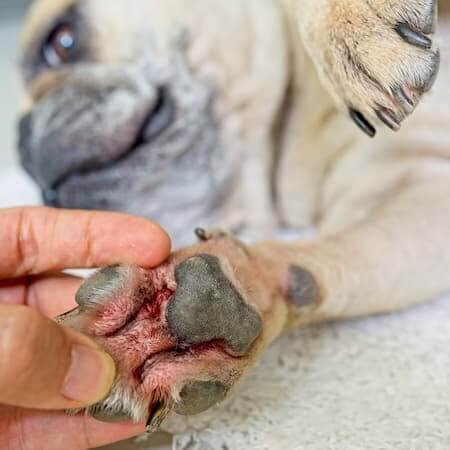Last Updated: 13/07/2025
Why does my dog always lick their paws?
Learn about the causes and solutions for constant paw licking.
Author: Dr Nicole du Plessis BVSc (Hons)
Reading Time: 8 minutes - short read
It's perfectly normal to see your dog licking their paws now and then as part of their regular grooming routine. However, when that occasional lick turns into obsessive or constant paw licking, it can quickly become a frustrating issue for both you and your furry companion.
Not only can it be noisy and disruptive, but it often signals an underlying problem that needs your attention.
Understanding the various causes behind this excessive behaviour is the crucial first step. By investigating why your dog is licking their paws so much, you can effectively address the root of the problem and provide your beloved pet with the much-needed relief and comfort they deserve.
Products to help manage allergies
2. Infection
Bacterial infections, ringworm or yeast infections can be another cause for licking. The infection can be the primary cause of the irritation and licking, or secondary to the initial cause of irritation to the feet. Secondary infections are commonly associated with underlying allergies which produce inflammation in the skin, weakening the barrier and allows infection to occur. You may notice sticky discharge (pus) with bacterial infections, and if there is a yeast infection, the paws are often malodorous along with greasy skin or crusting. Medicated shampoos like Malaseb can be used as an effective topical treatment aid for infected paws.
Infection can further exacerbate licking due to discomfort and irritation. It is very important to get the correct diagnosis and treatment for underlying infection. A veterinary consultation is recommended, particularly if you are seeing redness, discharge, discolouration, swelling and your dog is uncomfortable.

Nail Clippers for Dogs
6. Insect Bite
Insect bites can sting and cause your dog to hold up their paw and start limping. There may be a raised bump and redness at the site. Most insect bites are harmless and symptoms will improve within a day. Monitor your dog for any signs of a severe reaction such as extreme swelling, respiratory difficulty, vomiting, or collapse. If your dog shows any of these serious symptoms, or they have been bitten on their face or neck, do not delay in seeking veterinary attention for your pet.
8. Burns
Australia is well known for its bright weather and sunshine. However, the warm sun can cause heat stress and surfaces which may be too hot for your pet to walk on. Taking your dog out for a walk or run within the early hours of the morning or in the evening could help to prevent these situations. Shoes can provide some protection for their sensitive pads.
9. Parasites
Fleas, ticks and mites can cause irritation to various areas of your dog's skin.
Fleas are a very common external parasite visible to the naked eye, which can cause irritation to the pet by biting and feeding on a blood meal. Dogs are frequently allergic to fleas which can further exacerbate the itch.
Ticks can bury themselves anywhere on the dog. Ticks have been found in the ear canal, mouth, bottom and in between the toes and paw pads! Licking or chewing the area can be an attempt at removing the irritating tick.
Sarcoptes mite is a microscopic parasite that buries underneath the skin and can cause intense irritation, infection and hair loss to the area. It can also be passed to humans.
Keeping up to date with regular parasite prevention, even if you haven't seen any parasites, is the best way to prevent infestation in your pet.
Recommended parasite prevention
10. Behavioural
Anxiety and boredom can contribute to excessive licking. The repetitive licking can be a soothing mechanism for dog's, so they repeat the behaviour to help calm themselves. Unfortunately, the compulsive licking can cause skin lesions to develop such as acral lick granulomas, skin trauma and infection.
It is important to address the underlying cause for the anxiety. Never punish your dog for licking as this can create further anxiety issues. You can help your dog by engaging a positive reinforcement dog trainer and the help of your regular veterinarian. Calming aids and enrichment can also be useful in mild cases of anxiety.
Anxiety Relief
5 easy steps for paw health
Identifying any underlying medical causes for paw problems can be helpful in providing targeted ongoing support for your pet. If their paw licking is related to allergies, your vet may prescribe medication to help manage the itchiness and reduce symptoms.
For general maintenance and protection, there are several simple ways we can help keep our dog's paws healthy. Soothing balms can moisturise dry and cracked paws, daily inspection can allow early detection and removal of any foreign objects, and regular nail trimming to avoid overgrown nails.
1. Regular checks
Check their paws daily or after walks can help make sure there is nothing stuck in their pads or between the toes to cause irritation or pain. This allows for early intervention as you may notice issues sooner.
2. Moisturise their paws
Use a paw balm to prevent dry and cracked paws. Providing moisturisation can help with restoring and strengthening the skin barrier, making their paws less susceptible to external irritants.
3. Keep them clean
Give their paws a quick wipe after being outside to clean away any debris and plant material like prickly bindi. This can also help remove allergens from their skin and reduce symptoms of itching and inflammation.
4. Maintain nail care
Regular trimming of the nails every 1-2 months can prevent overgrown nails and potential injuries. Long nails are more likely to get caught and torn, which cause pain and bleeding while also exposing the sensitive quick to the environment. This can lead to infection if not treated.
5. Wear shoes
Put on some walking boots the next time you take your dog outside. Not only will they be a fashionable pooch but their paws will be protected from the hot concrete which can warm up quickly under the sun!
Recommended products for healthy paws
These handy wipes are pH balanced, hypoallergenic and dermatologically tested. Suitable for sensitive skin.
Easy to use with specially shaped blades for safer clipping.
These boots are designed to be extra-durable for outdoor walking and running, made with weather-resistant upper material.
Take home message
There are a number of different potential causes to your dog's licking. Taking note of any different activities or changes to routine such as new foods, treats or even the same food but new bag or new places your dog has visited can all help your veterinarian get to the bottom of your dog's excessive licking.
Your regular veterinarian may need to perform skin cytology, bacterial or fungal cultures, food elimination trials and occasionally radiographs to identify the cause of your dog's itchy feet. In some cases, medication or referral to a dermatologist may be recommended.
Feeding a premium-quality skin diet can improve skin barrier function. Topical therapies like medicated shampoos and conditioners can further assist with skin barrier health and can be helpful for ongoing management.
When to seek veterinary attention
If you ever notice excessive licking in your dog, especially alongside redness, hair loss, discharge, swelling or lameness, it is important not to delay treatment and seek the assistance of your regular veterinarian.
Further Reading
Want to read more? Check out our other articles:
What is the Best Dog Food for Skin Allergies?
Dogs with Sensitive, Itchy Skin
Why is My Dog Getting Ear Infections?
Flea, Tick and Worming Guide for Dogs




